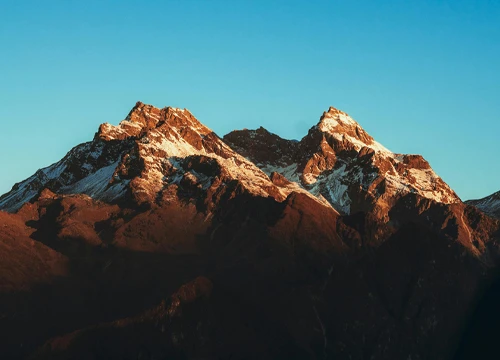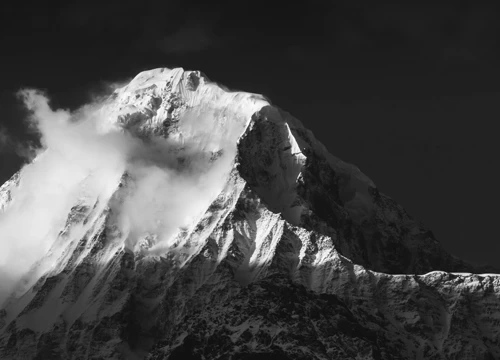Brand Voice: Empowering and Inspirational
Join us as we unravel the twists and turns of her incredible expedition, witnessing how passion and determination propelled her forward in the face of adversity. Through engaging storytelling, vivid descriptions, and personal anecdotes, we give you an intimate glimpse into the physical and emotional hurdles she encountered along the way.
This is more than just a story of climbing a mountain; it's a celebration of breaking barriers and shattering glass ceilings. So get ready to be inspired as we embark on this extraordinary journey of resilience, courage, and triumph.
The Challenges Faced by Female Trekkers
Female trekkers embarking on journeys like the one to Everest Base Camp often find themselves in a male-dominated environment where they must prove their capabilities and endurance repeatedly. The lack of representation and support for women in adventure sports can lead to feelings of isolation and self-doubt. Additionally, the physical demands of trekking in high-altitude regions can pose significant challenges for female trekkers, who may have to contend with issues like altitude sickness, fatigue, and muscle strain. Despite these obstacles, many women are drawn to the thrill of exploration and the sense of accomplishment that comes with conquering nature's toughest landscapes.
Breaking through the gender stereotypes that have long defined outdoor activities as male pursuits is another significant challenge for female trekkers. The perception that women are not as strong or capable as men in extreme conditions can create a barrier to entry for aspiring adventurers. Overcoming these preconceptions requires not only physical strength but also mental fortitude and unwavering determination. Female trekkers must navigate a complex terrain of expectations and biases, proving themselves capable at every step of the journey. It is a demanding task, but one that many women take on with grace and determination, determined to show the world what they are truly capable of.
Some problems no one talks about, but yet the females still feel
- The sense of getting stared at by other group trekkers or individuals is one of the most common problems.
- Getting teased by other groups of trekkers and people along the way.
- People are coming nearby and being more than friendly to develop or establish a relationship or to get close.
- Bleeding a lot when there is menstruation due to the cold and feeling the cramps in the stomach during periods.
- Not being able to openly let the male guide know about the problems they are facing gets a bit awkward.
- Feeling of awkwardness as there are no public bathrooms in the trails and females usually have to go behind the bushes and rocks.
- Not being able to trust individuals around you and feeling awkward and introverted.
Overcoming Physical Challenges During the Trek
The journey to Everest Base Camp is a grueling test of physical endurance, requiring trekkers to navigate challenging terrain, extreme weather conditions, and high altitudes. Female trekkers face the added challenge of combating the physiological differences that can affect their performance at high elevations. Altitude sickness, in particular, is a common concern for trekkers ascending to Everest Base Camp, as the reduced oxygen levels can lead to symptoms like headaches, nausea, and fatigue. To overcome these physical challenges, female trekkers must acclimatize gradually, stay hydrated, and listen to their bodies' signals to prevent altitude-related illnesses.
In addition to altitude-related concerns, female trekkers must also contend with the physical demands of trekking long distances with heavy gear. Carrying a backpack filled with essential supplies, navigating steep ascents and descents, and coping with unpredictable weather conditions can take a toll on the body. Proper training, including strength and endurance exercises, can help female trekkers build the physical resilience needed to tackle the demands of the journey. By preparing their bodies for the rigors of trekking, women can enhance their performance and minimize the risk of injuries or setbacks along the way. With determination and a commitment to physical fitness, female trekkers can conquer the challenges of the trail and reach new heights of achievement.
Your body is the part that you should mentally control; have enough food; drink at least 3 liters of water per day; and try to sleep for at least 8 hours during the trek.
Mental and emotional challenges on the journey
Beyond the physical effort required to trek to Everest Base Camp, female trekkers must also confront a host of mental and emotional challenges along the way. The isolation of remote mountain landscapes, the uncertainty of people's behavior, and the constant pressure to perform in a group day in and day out can all contribute to feelings of anxiety, fear, and self-doubt. Overcoming these internal obstacles requires a strong sense of resilience, a positive mindset, and effective coping strategies to navigate the emotional ups and downs of the journey.
One of the most significant mental challenges for female trekkers is the need to push past self-imposed limits and break free from the constraints of societal expectations. Women are often socialized to be cautious, obedient, and risk-averse, qualities that can clash with the adventurous spirit required for trekking to Everest Base Camp.
Conquering these internal barriers means confronting deeply ingrained beliefs about gender roles and embracing a new narrative of empowerment, courage, and independence. Female trekkers must cultivate a mindset of self-belief, resilience, and adaptability to thrive in the face of adversity and uncertainty. By developing mental toughness and emotional intelligence, women can overcome the mental challenges of the journey and emerge stronger, wiser, and more confident in their abilities.
Remember, after 4500 meters, it's you yourself for yourself by yourself for yourself. This is the key to surviving, and be honest with the guide. At least be frank with him in the whole group because he or she is the expert, so you need to be frank and honest with them about your physical and mental condition.
Support and Empowerment for Female Trekkers
While the journey to Everest Base Camp may be a solitary pursuit in many respects, female trekkers do not have to face its challenges alone. A strong support network of fellow trekkers, experienced guides, and supportive organizations can provide invaluable assistance and encouragement along the way. Building connections with other women adventurers, sharing experiences, and learning from each other's successes and setbacks can create a sense of camaraderie and solidarity that bolsters the spirits of female trekkers on their quest for the summit.
In addition to peer support, female trekkers can benefit from the guidance and expertise of experienced guides and mentors who understand the unique challenges faced by women in the outdoors. Professional trekking companies that prioritize gender equality and inclusivity can offer tailored support, safety measures, and resources to empower female trekkers to succeed. By seeking out opportunities for mentorship, training, and community engagement, women can access the tools and knowledge needed to navigate the complexities of the trek and emerge stronger and more confident on the other side. Empowerment comes not only from within but also from the connections and collaborations forged with like-minded individuals who share a passion for adventure and a commitment to breaking boundaries.
Inspiring Stories of Successful Female Trekkers
Amidst the challenges and triumphs of the journey to Everest Base Camp, there are countless inspiring stories of female trekkers who have defied expectations, shattered stereotypes, and achieved remarkable feats of endurance and determination. From seasoned mountaineers to first-time trekkers, women from all walks of life have embarked on the arduous trek to the world's highest peak, leaving a trail of inspiration and empowerment in their wake. These stories of courage, resilience, and perseverance serve as beacons of hope and motivation for aspiring female adventurers, showing them that anything is possible with passion, dedication, and a refusal to give up.
One such inspiring tale is that of a young woman who overcame a debilitating injury to fulfill her dream of trekking to Everest Base Camp. Despite facing numerous setbacks and obstacles along the way, she refused to let her physical limitations define her capabilities or dampen her spirit of adventure. Through sheer determination, unwavering resolve, and the support of her fellow trekkers, she conquered the challenges of the trail and reached the base camp, proving to herself and the world that resilience and courage know no bounds. Her story is a testament to the power of perseverance, the resilience of the human spirit, and the transformative potential of embracing challenges head-on. It serves as a reminder that, with the right mindset and support system, women can achieve extraordinary things and inspire others to follow in their footsteps.
- Physical Training: Prioritize strength and endurance exercises to build the physical resilience needed to tackle the demands of trekking at high altitudes.
- Acclimatization: Allow ample time for acclimatization to prevent altitude sickness and ensure a smooth ascent to Everest Base Camp.
- Gear Selection: Invest in high-quality, lightweight gear and clothing suitable for the changing weather conditions and rugged terrain of the trek.
- Nutrition and Hydration: Maintain a balanced diet rich in nutrients and stay hydrated throughout the journey to support your body's performance and recovery.
- Mental Preparation: Cultivate a positive mindset, mental resilience, and effective coping strategies to navigate the emotional challenges of the trek.
- Safety Measures: Follow the guidance of experienced guides, adhere to safety protocols, and prioritize your well-being at all times to mitigate risks and ensure a safe trekking experience.
By following these tips and preparing diligently for the journey ahead, women can embark on the adventure of a lifetime with confidence, determination, and a spirit of exploration. The path to Everest Base Camp is challenging, but with the right mindset, support, and preparation, female trekkers can conquer the highest peak in the world and discover the strength, courage, and resilience within themselves.
Recommended Gear and Preparation for the Journey
As female trekkers gear up for the adventure of a lifetime at Everest Base Camp, having the right equipment and preparation is essential for a safe and successful journey. Here are some recommended gear and preparation tips to help women navigate the challenges of the trail and make the most of their trekking experience:
- Footwear: Invest in high-quality, waterproof hiking boots with good ankle support to protect your feet on rugged terrain and steep ascents.
- Clothing: Pack lightweight, moisture-wicking layers that can be easily adjusted to accommodate changing weather conditions and temperature fluctuations.
- Backpack: Choose a comfortable, well-fitted backpack with adjustable straps and compartments to distribute weight evenly and reduce strain on your back.
- Sleeping Bag: Opt for a warm, lightweight sleeping bag rated for cold temperatures to ensure a restful night's sleep at high altitudes.
- Trekking Poles: Consider using trekking poles to provide stability and support on uneven terrain and reduce the impact on your joints during descents.
- First Aid Kit: Pack a comprehensive first aid kit with essential supplies like bandages, pain relievers, blister pads, and medications to address common trekking injuries and ailments.
- Personal Care Items: Bring along essentials like sunscreen, lip balm, hand sanitizer, and personal hygiene products to stay comfortable and healthy throughout the journey.
By preparing diligently, packing wisely, and equipping themselves with the right gear, female trekkers can embark on the trek to Everest Base Camp with confidence, readiness, and a sense of adventure. With the right tools at their disposal, women can navigate the challenges of the trail, embrace the beauty of the Himalayas, and create lasting memories of an unforgettable expedition to the top of the world.
Safety Considerations for Female Trekkers
Safety is paramount for female trekkers embarking on the challenging journey to Everest Base Camp, where the risks of altitude sickness, extreme weather conditions, and rugged terrain can pose significant hazards. Prioritizing safety measures, following expert guidance, and staying vigilant at all times are crucial for ensuring a secure and enjoyable trekking experience. Here are some key safety considerations for female trekkers to keep in mind before and during the journey:
- Acclimatization: Allow sufficient time for acclimatization to high altitudes to prevent altitude sickness and ensure a safe ascent to Everest Base Camp.
- Weather Awareness: Stay informed about weather forecasts, prepare for changing conditions, and adjust your itinerary as needed to avoid exposure to extreme weather events.
- Hydration and Nutrition: Drink plenty of water, eat nutritious meals, and monitor your hydration and nutrition levels to support your body's performance and recovery at high elevations.
- Group Dynamics: Trek with a reputable trekking company or experienced guides, stay with your group at all times, and communicate openly about your needs, concerns, and any health issues that may arise.
- Emergency Response Plan: Familiarize yourself with emergency procedures, carry a communication device like a satellite phone or personal locator beacon, and know how to seek help in case of emergencies or accidents.
- Self-Care: Prioritize self-care, listen to your body's signals, and know when to rest, hydrate, or seek medical attention if you experience symptoms of altitude sickness or other health issues.
By staying vigilant, prepared, and informed about safety best practices, female trekkers can minimize risks, enhance their well-being, and enjoy a safe and rewarding trekking experience to Everest Base Camp. Empower yourself with knowledge, awareness, and proactive measures to ensure a memorable and secure journey through the majestic landscapes of the Himalayas.
Conclusion and Celebration of Female Achievements
As we reach the summit of our exploration into the journey of a female trekker to Everest Base Camp, we celebrate not only her individual triumph but also the collective achievements of women adventurers around the world. The challenges faced, the obstacles overcome, and the victories won along the way are a testament to the strength, resilience, and courage of women who dare to defy expectations and push beyond their limits. In the face of adversity, they find empowerment; in the depths of uncertainty, they discover resilience; and in the heights of the Himalayas, they uncover the limitless potential within themselves.
The journey to Everest Base Camp is more than just a physical expedition; it is a transformative experience that challenges, inspires, and empowers women to reach new heights of accomplishment and self-discovery. As we reflect on the trials and triumphs of our protagonist's ascent, we are reminded of the boundless possibilities that await those who dare to dream, strive, and persevere against all odds. Her journey to the top is a beacon of hope, a source of inspiration, and a testament to the indomitable spirit of women who refuse to be defined by limits or boundaries.
In closing, let us raise a toast to the fearless female trekkers who brave the mountains, conquer the peaks, and blaze trails of courage and determination for generations to come. May their stories ignite the flames of possibility, resilience, and empowerment in all who hear them, and may their journeys inspire us to embrace challenges, break barriers, and soar to new heights of achievement. Here's to the women who climb mountains, defy expectations, and prove that the sky is not the limit—it's just the beginning of their extraordinary adventures.







